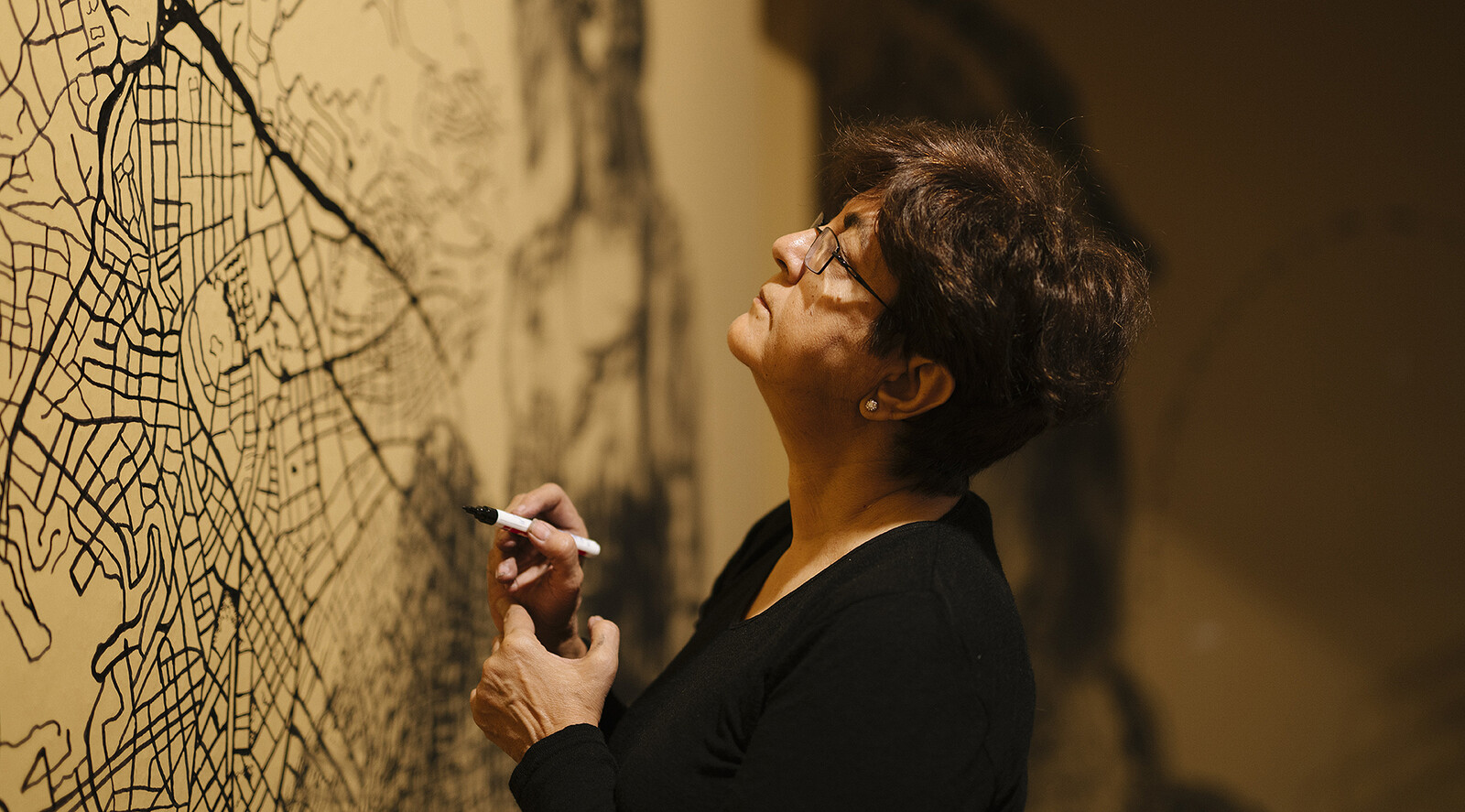You Don’t Hear Me
June 19–November 29, 2020
Parc de Montjuic, s/n
08038 Barcelona
Spain
Hours: Tuesday–Sunday 10am–8pm
T +34 934 43 94 70
info@fmirobcn.org
Fundació Joan Miró and ”la Caixa” Foundation present a major solo exhibition by Nalini Malani (Karachi, Undivided India, 1946), offering an in-depth exploration of some of the milestones in Malani’s career, spanning the period of 1969–2020.
Curated by Martina Millà, Head of Exhibitions at the Fundació Joan Miró, in close collaboration with the artist, the exhibition addresses a defense of social, feminist and environmental justice and a condemnation of inequality and structural violence that women and underprivileged groups suffer around the world.
You Don’t Hear Me, Malani’s first museum solo exhibition in Spain, starts with two immersive charcoal wall drawings which combine the city plans of Barcelona and Mumbai, juxtaposed with a series of monumental portraits. These unique wall drawings are the beginning of the spine, as the artist likes to describe it, a series of wall drawings that continues throughout the five large rooms that constitute the exhibition.
Each room is installed as one artwork, specified by subject, and showcases one of the diverse media that Malani has experimented with over the decades, such as 16mm film, shadow plays, reverse paintings, and most recently digital iPad animations. Placed in a non chronological thematic order, the selected works highlight the rich complexity of Malani’s output, internationally known for her critically committed and multi-layered imagery.
In the late 1960s, Nalini Malani emerged as a provocative feminist voice, in a male dominated Indian art scene, pioneering with experimental film, camera-less photographs and other nontraditional media. With loaded titles such as Onanism and Taboo, her works denounced the discrimination women suffered in her country, a topic the artist has continued to explore since. In the late ‘80s, Malani again broke out of the painting frame to reach a wider audience as a protest against the rise of orthodox elements in politics. With her rich textures and use of media, developed over the decades, Malani seduces the visitors into her spaces, to engage in the multiple layers of her critical voice.
In her constant experimentation, Malani has never ceased to use new technologies. Since 2017, in her seventies, she has started creating animation pieces on her tablet and sharing them regularly on social media. The last room of the exhibition features a seven-channel animation chamber, as the artist coined this presentation format, titled Can You Hear Me?, showing a selection of 56 of these animations, projected an overlapping over black walls.
You Don’t Hear Me ends on November 29, with an Erasure Performance, directed by Malani herself. The artist started using this format in 1992, and has executed it in different museums internationally, such as Centre Pompidou (Paris), Stedelijk Museum (Amsterdam), and Kiran Nadar Museum of Art (New Delhi). The contents and execution of the Erasure Performance are not announced in advance to the public.
A catalogue will be published to accompany the exhibition. Its main focus will be the important role literary sources have played in Malani’s practice.
Malani is committed to sustainable exhibition practices and for this reason her show in Barcelona only includes works from museums and private collections in Western Europe, namely the Burger Collection, Castello di Rivoli and Galerie Lelong.
The exhibition is part of the Joan Miró Prize, which Nalini Malani won in 2019. The Joan Miró Prize is awarded every two years. Its past recipients have been Olafur Eliasson (2007), Pipilotti Rist (2009), Mona Hatoum (2011), Roni Horn (2013), Ignasi Aballí (2015) and Kader Attia (2017).
Fundació Joan Miró is an internationally recognized center in Barcelona for Miró scholarship and contemporary art research, which showcases, next to the Miró collection, temporary exhibitions of 20th and 21st-century artists.
“la Caixa” Foundation is a non-profit organisation that is more than 115 years committed to the present and future of people.



